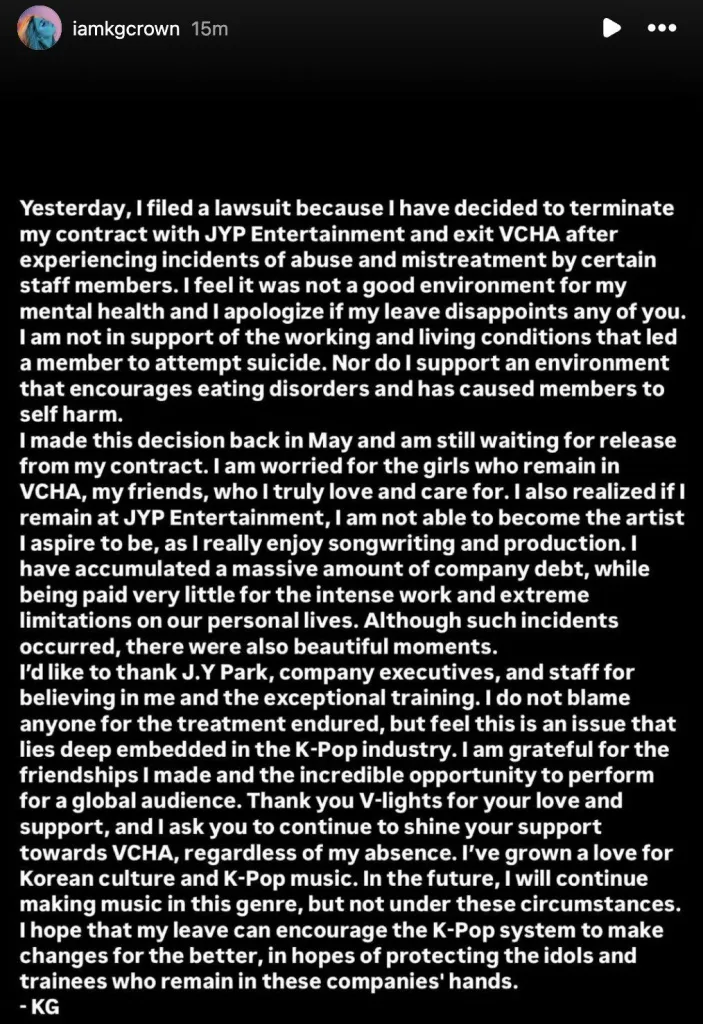VCHA’s KG Files Lawsuit Against JYP Entertainment Allegations of Abuse and Contract Termination
KG, a member of the global girl group VCHA, has filed a lawsuit to terminate her contract with JYP Entertainment. The young artist’s Instagram post, shared on December 7, 2024, revealed distressing allegations of abuse and mistreatment that led to her decision. This article delves into the details of KG’s claims, the legal implications, and the larger issues of K-pop industry culture that have sparked widespread discussions.
Table of Contents
Background KG Vcha Lawsuit: VCHA and the A2K Project
VCHA, a girl group formed through the collaborative project “A2K” (America2Korea), is a joint venture between JYP Entertainment and Republic Records. The group was formed in 2023 as part of an effort to bring international talent into the K-pop fold. Although they initially gained attention with their potential performance at Lollapalooza, VCHA pulled out of the event last minute and has since been on hiatus, leaving fans and industry insiders questioning the future of the group.
KG’s Shocking Announcement
On December 7, 2024, KG took to her Instagram story to announce that she had filed a lawsuit to terminate her contract with JYP Entertainment. The decision comes after months of alleged mistreatment by certain staff members, which KG claims had a severe impact on her mental and physical well-being. In her post, she described how the toxic work environment led to extreme consequences, including eating disorders and self-harm, among the group members.
Despite the gravity of her allegations, KG made it clear that her grievances were not directed at J.Y. Park or the company executives, but rather at the broader, systemic issues within the K-pop industry. She expressed gratitude towards JYP Entertainment’s higher-ups, explaining that they were not directly responsible for the abuses.

Allegations of Abuse and Mistreatment
KG’s Instagram story highlighted several distressing claims, including:
Mental Health Struggles
KG reported that the harsh work environment had caused her to suffer from significant mental health issues, which were exacerbated by the company’s demands.
Physical Abuse
She referred to incidents of mistreatment by certain staff members, though she did not specify names or further details.
Extreme Living Conditions
KG alleged that the living and working conditions for VCHA members were harsh, with extreme restrictions on personal lives and limited compensation for their hard work.
Debt Burden
According to KG, she was burdened with significant debt tied to her contract, a common issue many K-pop idols face. This financial strain is often cited as a form of exploitation within the industry.
These allegations, though shocking, have resonated with fans and industry experts who have long criticized the abusive nature of K-pop’s idol training system.
Impact of the K-pop Industry’s Exploitative Practices
KG’s lawsuit shines a light on the broader issues of the K-pop industry’s exploitative practices, which have been well-documented in recent years. According to a 2023 report by the Korean National Assembly, many K-pop idols face extreme working conditions, including long hours, strict dietary restrictions, and minimal rest. These conditions are generally accompanied by heavy financial burdens due to contract debts, leaving idols with little control over their careers.
In recent years, several high-profile K-pop stars have spoken out about their experiences, adding fuel to the growing calls for reform within the industry. Experts believe that the case of KG may be a tipping point for a broader reckoning with the industry’s toxic practices.
Legal Regulations and Implications
In the face of these allegations, the legal ramifications of KG’s lawsuit are significant. Under South Korean law, the Fairness of Employment Act (2015) and the Korean Labor Standards Act protect workers, including K-pop idols, from unfair working conditions. These laws ensure that workers are treated with dignity and that they are not subjected to abusive work environments or conditions that harm their physical or mental health.
KG’s legal team may argue that JYP Entertainment violated these laws by failing to protect her from the alleged abuse, subjecting her to unreasonable demands, and imposing unfair financial obligations. Given that K-pop idols are often treated as high-risk assets, their contracts are generally more stringent, but they are still entitled to protections under labor law.
The Role of Trainee Debt in K-pop
One of the more troubling aspects of K-pop contracts is the phenomenon of trainee debt. Aspiring idols often incur significant debts due to training costs, housing, and other expenses that are deducted from their earnings. This practice has been heavily criticized by labor advocates and is a focal point in KG’s allegations. In her case, she claimed to have been burdened by such debt, which is not uncommon in the K-pop industry.
Related Articles For You:
Mizkif Lawsuit Update Adrianah Lee’s Lawsuit Against Mizkif, OTK, and Others – A Detailed Overview

JYP Entertainment’s Response
Following the public announcement of KG’s lawsuit, JYP Entertainment released a statement acknowledging the differences in opinion but denying that they had received the official lawsuit filing as of December 8. The agency stated that they had previously engaged in discussions with KG’s representatives and were in the process of confirming the details of the situation. JYP Entertainment emphasized that they would proceed according to the legal process.
Despite the agency’s attempts to downplay the matter, the public outcry has only intensified, with fans and industry observers calling for accountability and reform within JYP Entertainment and the K-pop industry as a whole.
Reactions from Fans and Industry Experts
The response from fans and industry experts has been largely supportive of KG. Many fans have expressed solidarity with her, condemning the mistreatment she allegedly faced. Some have even pointed out that similar treatment has been reported by other artists within the company, citing the experiences of TWICE and GOT7 as examples.
Experts in the field of entertainment law have argued that KG’s case could potentially set a precedent for other idols who wish to challenge the exploitative practices of major K-pop agencies. If successful, KG’s lawsuit could pave the way for more idols to seek justice for the mistreatment they have suffered.
The Future of VCHA and KG
As VCHA was set to make a comeback in 2025, KG’s departure raises questions about the future of the group. While the company has not yet confirmed how they will proceed without her, it is clear that her absence will have a significant impact on the group’s dynamic and their future plans. Fans are left wondering how the remaining members will fare and whether they will continue to be subjected to similar conditions.
KG’s future, however, seems to be taking a new direction. As she seeks to terminate her contract and leave behind a toxic environment, many are hopeful that she will find new opportunities where her talents will be appreciated and nurtured in a healthier work environment.
The Broader Industry Impact: A Call for Reform
KG’s case has sparked wider conversations about the exploitative practices in the K-pop industry. Experts believe that the K-pop system needs to undergo significant reform, especially in terms of how idols are treated during their training and career. This could include more transparency regarding contract terms, more mental health support, and better working conditions.
Statistical Evidence on K-pop Mental Health Concerns
A 2023 report by the Korean National Assembly found that 40% of K-pop idols reported experiencing mental health issues, with 20% of them citing high levels of stress related to contract conditions and performance demands. Studies have also highlighted a direct correlation between the industry’s rigorous training schedules and physical health problems, such as eating disorders.
Expert Opinion on Mental Health in K-pop
Mental health experts have weighed in on the industry’s pressure-filled environment. Dr. Kim Jae-Hyun, a renowned psychologist specializing in entertainment psychology, explained that the extreme demands placed on K-pop idols contribute to anxiety, depression, and even suicidal tendencies. “The culture of perfectionism, constant competition, and lack of personal freedom leads to long-term mental health issues,” she stated.
Corporate Social Responsibility in K-pop
This case also brings into focus the Corporate Social Responsibility (CSR) practices of K-pop agencies. Following KG’s lawsuit, there is growing pressure for agencies like JYP Entertainment to reevaluate their CSR strategies. Industry observers argue that greater accountability and transparency are necessary to protect the well-being of idols, particularly when they are so young and vulnerable.
Advice for Aspiring K-pop Idols
For aspiring K-pop idols, KG’s story serves as a cautionary tale. Experts advise aspiring idols to:
- Understand contract terms thoroughly before signing, especially regarding personal rights and financial obligations.
- Seek legal advice if mistreatment is suspected, as labor laws in Korea provide protections against unfair practices.
- Prioritize mental health and avoid environments that jeopardize emotional or physical well-being.
JYP Entertainment’s Future Actions
In response to KG’s lawsuit, JYP Entertainment may be forced to make changes to their internal practices. Experts predict that the company may face increased scrutiny from fans and regulators, possibly leading to reforms in contract structuring and mental health support for artists. The case could also trigger changes in how contracts are managed across the K-pop industry.
Potential Long-Term Effects on the K-pop System
KG’s legal battle could be a catalyst for broader change in the K-pop industry. If successful, her lawsuit may lead to a more equitable system for idols, where exploitation is reduced, and their mental health and well-being are prioritized. In the long term, the industry may see shifts toward more artist-friendly practices and greater transparency, helping prevent further cases of abuse.
Conclusion A Turning Point for the K-pop Industry
KG’s decision to file a lawsuit against JYP Entertainment has sparked a much-needed conversation about the dark side of the K-pop industry. The case highlights the need for reform in the way idols are treated and underscores the importance of protecting young talent from exploitation.
As fans rally behind KG, there is hope that her brave actions will lead to lasting change within the industry. This case, along with the ongoing efforts of other idols to challenge the system, may ultimately contribute to a more equitable and supportive environment for artists in the K-pop world.
Sources:
- Soompi: VCHA’s KG Leaves Group + Files Lawsuit to Terminate Contract
- Korean National Assembly Report on K-pop Idols’ Work Conditions
- Fairness of Employment Act, 2015
About the Author

Sarah Klein, JD, is a licensed attorney and legal content strategist with over 12 years of experience across civil, criminal, family, and regulatory law. At All About Lawyer, she covers a wide range of legal topics — from high-profile lawsuits and courtroom stories to state traffic laws and everyday legal questions — all with a focus on accuracy, clarity, and public understanding.
Her writing blends real legal insight with plain-English explanations, helping readers stay informed and legally aware.
Read more about Sarah
